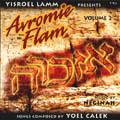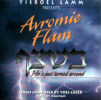December 25, 2003
88.7 FM WJCU
Conducted by Tzvi Turner and Ben Bresky

Jewish Community Radio: We are on with Avromie Flam. That was Tov Lehodos we just heard.
Avromie Flam: Yes, that was my most recent album.
Jewish Community Radio: That came out in 2000?
Avromie Flam: Right.
Jewish Community Radio: Youíre doing a new one?
Avromie Flam: Iím actually in the mixing process, which is one of the final stages of an album production. My new album, imeretz Hashem, will be out hopefully in the next month or two.
Jewish Community Radio: Do you purposely have one English song on each album?
Avromie Flam: Thatís an interesting question. You see, it used to be most of the artist, most of the singers felt, well, we need the English song for the album.
Jewish Community Radio: Why? Because itís for an English audience?
Avromie Flam: Well, itís kind of just to give good color to the album. There are people out there who would like to hear a little bit possible more secular. As matter of fact on the Tov Lehodos album I have a Yiddish song. The lyrics are transliterated in the album cover. I did not have an English song on the latest album. I say its interesting you ask because a lot of the artists are finding now that just to put a song on that has English lyrics, a lot of the songs are just falling by the wayside. Because itís like, okay we got one crack. Typically the album will be ninty percent Hebrew lyrics. Theyíll put a song out and the song just kind of slips away. So itís become pretty much the feeling of the artist that if you have something really, really special, such as the great famed Someday, then youíll give a go at it. But theyíre not easy to come by.
Jewish Community Radio: How do you think itís changed from when you came out with your first album in 1995 and now? I mean there seems to be a lot more Jewish CDs available. I mean I just spoke to, I think it was Yossi Green the other day, and he said, guess how many albums hit the market the first day of Hanukah.
Avromie Flam: Wow. Thatís a good question. Hanukah is usually the time artists are holding out for the holiday shopping season. Youíd say probably like 10 or 15 albums.
Jewish Community Radio: You know what it was? He said more like 30 albums hit the store. I mean ten, twenty years ago it was one every few months.
Avromie Flam: Wow. Well baruch Hashem, the younger generation -- and typically thatís what youíre going to find -- the younger generation coming out with these new albums, are all finding that they can give a go at it. They can put a hand in there and say, I can sing well, which many people can, although its not just about singing well, its about performing about actually being able to perform the songs not just them having a nice voice. And then thereís people who can actually perform but donít have a nice voice. I mean it takes a lot to be able to go out there and put out an album. But the younger generation is saying, hey we could do it. Today a lot of people have the in-house systems. Theyíre able to record more cost-effectively. Also itís just the trend, the way life goes where people are picking up and getting involved where years ago you wouldnít do just because whether it was finances or the ability to get the right people to market you. I imagine when Yossi says that comment of 30 albums coming out, he probably has a bit of a little smile in his voice. In a way itís really a great thing and in a way it can really hurt the market when the market gets flooded. Iíve spoken to a number of people who say, well, thereís so many albums coming out that I donít even buy anything because I donít know what to buy and spend my money on. And itís really hard. You have to be an educated consumer. To find out whatís really becoming popular and whatís a proper production. Because in a real production thereís a lot of time and a lot of finances go into it.
Jewish Community Radio: And actually, Yossi, he was on our show a couple weeks ago, and he said itís not like twenty years ago where you had to have a good voice. In todayís market anyone with a decent voice can put out a tape. And I look at as almost like deregulation in the utility business. It was always up to a handful of companies and in the singing world it was always just a handful of singers. And I think its brought out a lot of new talent. Thatís new talent that you and even the older singers can tap for newer songs or even different styles. Thatís where you see the Eli Gerstners and the new composers. I mean, Yossi Green to me is still the king. I donít think thereís a song out there that he composed that I donít like. Okay, letís listen to some more Avromie Flam and then weíll be back on Jewish Community Radio.

Jewish Community Radio: So let me ask you, I think this whole Mordechai Ben David, Avromie Flam thing, itís kind of its own genre. You know, with the horns and everything. Maybe you could elaborate. I mean, itís not rock, itís not jazz, itís like yeshivish or Chassidic. But itís not all "Chassidic". Itís its own little thing.
Avromie Flam: Itís its own little thing. Thatís exactly right. Basically, the music that you hear today mostly came out from a very, very talented young man -- he was a very young man back then -- by the name of Yisroel Lamm. He began writing and arranging albums. He worked with Neginah and created the first Neginah album way before the Neginah wedding albums were out. He created the sound of what today we know as the Jewish music sound of the horns, of course the rhythm section. The slow songs have the string section. The upbeat songs have the brass. Typically thatís what youíre going to hear in a song. Youíll hear the ba da ba ba ba ba da ba. Thatís Yisroel Lammís stamp. Moshe Laufer subsequently joined the arranging area along with others and they all followed similarly in that style. What happens is the Jewish music will sound the same. If you speak to somebody whoís more secular, theyíll say it sounds all the same. And of course we know itís not all the same. Every song has its own neshoma, its own soul, its own heart, its own emotion behind it in the song. But the music that accompanies it, yes its true. Itís similar style. The fast songs will have the ba da ba bam. The slow songs will have the strings with the slow ballad piano. People say to me sometimes, why donít you do something very unique. Either they say, all the way to the left they say, just rock and roll. A lot of heavy guitars. Now what we consider rock and roll and heavy guitars, some other people will say, thatís rock? Thatís not even rock.
Jewish Community Radio: Absolutely. Iíve heard people say, "oh, thatís too rock," or "thatís not Jewish enough."
Avromie Flam: Right. You hear that. The thing is that as artists, weíre, for lack of a better word, weíre afraid. We donít want to jump in and start changing the style.
Jewish Community Radio: And I donít think thatís just unique to the Jewish music either.
Avromie Flam: Right, right. For two reason we wouldnít do it. A., is because we just donít know that it will sell. Because people will say well thatís a whole different sound. Weíre not used to that sound. So itís kind of "ehh, thatís not for us" so to speak. And B., weíre shouldering a lot of responsibility in doing that. Because over the years, the music, believe it or not, in very subtle ways, has changed. If you go back and listen to the Rabbiís Sons albums, which is back in the 60ís. When I was growing up the Rabbiís Sonís album came out
Jewish Community Radio: Thatís the name of the group?
Avromie Flam: Yes. The Rabbiís Sons with Laibel Sharfman, Michael Zietland, they were really the first group that jumped in. When it was the era of the Moditz Niggunim of the Gerer Niggunim, Cantor David Werdyger, the father of the famed MBD.
Jewish Community Radio: So those are the guys you jammed to growing up?
Avromie Flam: Thatís what we heard, but interestingly enough, a lot of households wouldnít even listen to the music of the Rabbis Sons. They felt that it was too much "rock and roll". Now you take that CD out now and we pop it in and youíll hear it and you would laugh. Because itís a "thatís rock and roll?" feeling.
Jewish Community Radio: You know when I interviewed the band YIDcore, he told me his rebbe said, "why do you have to make it more modern? Shlomo Carlebach made it modern enough." And we think Shlomo Carlebach is traditional.
Avromie Flam: Itís so true. However you do find that some artists are beginning to move more in the way of more, for lack of a better word, more state-of-the-art sound. More of todayís sound, where they use techno music, which immediately brings in a different new age sound.
Jewish Community Radio: Like Eli Gerstner or even the Yeshiva Boys Choir had some hard rock guitars. It surprised me a little.
Avromie Flam: Right. Itís interesting. But baruch Hashem, we have great music. We have great stuff going on in Cleveland. I hear it a lot people. Tzvi, you obviously know first hand. Cleveland is not what it was and itís beginning to pick up. And I think you, Ben and Tzvi have a big hand in beginning the move of Cleveland moving into the, so to speak, big city of Jewish music that we have here in New York. You know Nachum Segal began a radio show...
Jewish Community Radio: And you know he began on a college radio station and heís still on a college radio station and thatís what we are.
Avromie Flam: Oh yeah. And I tell Nachum so many times when Iím on the air. I say look, the bottom line is todayís Jewish music and all us performers, we have to give him thanks more then anybody. Because if not for Nachum, the Jewish music industry would not be what it is today. And he just has a show of two or three hours in the morning. I mean, can you imagine if it was all day? But even with you a few hours every day. I understand your show is a once a week show?
Jewish Community Radio: We have twice a week. Friday from 1:00 to 1:00 and 7:00 to 8:00 Sunday morning.
Avromie Flam: Thatís a great, great start. One day Iíll be calling in on a interview and youíll be saying, wow, every day of the week, music, music, music. Hours and hours. And you, Tzvi and Ben, were the pioneers who actually got Cleveland off into this major city of music.